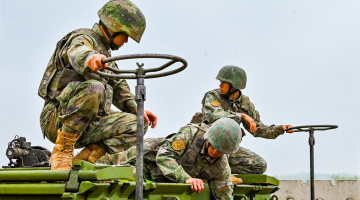
By Chen Yang
When talking about the China-India border clashes at a press briefing of the State Department on July 8, local time, US Secretary of State Mike Pompeo said, "From the mountain ranges of the Himalayas to the waters of Vietnam's Exclusive Zone, the Senkaku Islands and beyond, Beijing has a pattern of instigating territorial disputes." Pompeo's vicious attack on China is nothing new. His "pattern of instigating territorial disputes" rhetoric this time is not only confounding white with black, but also an agitation of sentiments.
As a matter of fact, it should be China's neighboring countries, not the US, that are best positioned to say whether China has formed "a pattern of instigating territorial disputes". Let's first take a look at the China-India border. The right and wrong of the Galwan Valley incident is very clear. Even India itself couldn't feign ignorance. Indian Prime Minister Modi recently said in public that "Nobody has intruded into our border, neither is anybody there now, nor have our posts been captured". Then let's turn our eyes to the South China Sea. Thanks to the concerted efforts of China and ASEAN countries in recent years, the overall situation in the South China Sea has maintained stable and positive. The cooperation between China and ASEAN countries in such areas as maritime search and rescue, oceanic environmental protection and scientific research has made substantial progress. The consultations on the Code of Conduct (COC) in the South China Sea are accelerating in an orderly manner, with both sides forming a clear consensus on reaching the COC at an early date.
Zhou Fangyin, a professor at the Guangdong Institute for International Strategies, held that the reactions and statements by the neighboring countries are most convincing about China's neighboring diplomacy. Their statements have all clearly demonstrated that instead of forming a so-called "pattern of instigating territorial disputes", China has exercised restraint most of the time, as well evidenced by its recent handling of the Galwan Valley clashes.
Neighborhood diplomacy holds a primary position in China's overall diplomacy. A review of our diplomatic efforts in the past few years shows that China and its surrounding neighbors have worked closely together for win-win results in the Lancang-Mekong Cooperation, China-Pakistan Economic Corridor (CPEC), the "China-Japan-ROK+X" cooperation mode, the Belt and Road Initiative (BRI), etc. Since the outbreak of the COVID-19 pandemic, the mutual help among these countries has further deepened their relationship. It is China's concept of neighborhood diplomacy featuring "amity, sincerity, mutual benefit and inclusiveness" that has given birth to such bountiful fruits of regional collaboration. If, as Pompeo falsely asserted, China has indeed formed "a pattern of instigating territorial disputes", how would the neighboring countries be willing to continue deepening the exchanges and cooperation with China?
As the US presidential election is getting closer, certain people are racking their brains to embroil China into the campaign in the attempt to gain more votes by playing the China card. Pompeo's trick of driving a wedge between China and its surrounding neighbors is essential to serve their election at home rather than genuinely for the good of those countries. According to Professor Zhou Fangyin, the US sees in India, Japan, Vietnam, or the Philippines the "chess piece" against China in its strategy. Once in conflict with China, the neighboring countries know very well whether the US is willing to go all out for them.
China's sticking to the policy of "building friendship and partnership with neighboring countries" is neither a tactic nor an approach, rather it's a solemn and strategic decision China has made. History has proved and will continue to prove that China is a reliable neighbor as well as a friend.
Disclaimer: This article is originally published on haiwainet.cn, which is the website of Overseas Edition of the People's Daily. The article is translated from Chinese into English and edited by the China Military Online. The information, ideas or opinions appearing in this article do not necessarily reflect the views of eng.chinamil.com.cn.









